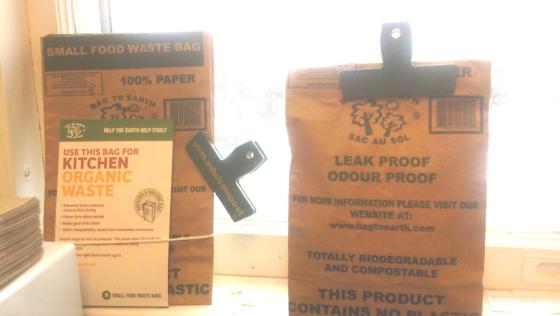Posted January 13, 2014 at 08:09am by
Food Cycle Coalition is the Farm to Plate Task Force Linking Food Systems and Waste Management

By: Pat Sagui, Composting Association of Vermont director
The Food Cycle Coalition Task Force is a coalition of organizations with expertise in food rescue, agriculture, solid waste management, composting, and energy production. It has formed to help Vermonters transition to universal recycling of these materials as outlined in Act 148. The Food Cycle Coalition is committed to building healthy and resilient communities where no one is hungry and no resource is wasted.
A primary goal for the group is to help develop accessible programs, services, and facilities for food rescue and organics diversion that can support local food systems and economies. This includes educating generators about how to capture and redirect currently landfilled material such as food suitable for rescue to feed people, food scraps to feed livestock, food scraps and other organic materials for composting – with or without heat recovery – and anaerobic digestion. The Coalition has already leveraged over $100,000 of in-kind resources from its member organizations to complete this work. The group is currently conducting an asset mapping of relevant statewide resources and capacity to help reach the goals in Act 148. This information will become part of a work plan that will guide the Coalition’s efforts to prepare for 2020 when the ban on landfilling these materials becomes mandatory for everyone.
Currently Vermonters throw away an estimated 98,739 tons (or 197,478,000 lbs) of valuable food and leaf and yard debris annually. When those materials decompose in a landfill they generate significant amounts of methane, a harmful greenhouse gas that has over 20 times the heat trapping traits of carbon dioxide. The Food Cycle Coalition wants to see these materials managed in a more socially and environmentally beneficial way that is good for Vermont businesses, communities, and improves food security. For example, according to a recent report released by the Institute for Local Self-Reliance that evaluates the economics of composting and the use of compost in Maryland, composting sustains twice as many jobs as landfilling. On a dollar-per-capital-investment basis, the number of jobs supported by recycling and composting versus disposal options is estimated to be three times more than landfills, and 17 times more than incinerators. Many of these jobs are skilled jobs such as equipment operators, with typical wages in the $16 to $20 per hour range ($13 - $16 in Vermont).
Diverting quality food and other organic materials away from the landfill provides substantial benefits to Vermonters and the state’s natural resources. These benefits include:
- Job Creation: Recycling and composting programs have been shown to create up to 4 jobs for every 1 job in landfill operation. (source: Institute for Local Self-Reliance)
- Stronger communities: Programs to increase food rescue, composting, and agricultural and energy production bring communities together to develop local solutions. In doing so, communities build social capital, leverage their own assets and strengthen their local food systems to support their own goals and aspirations.
- Increased food security: Currently, 1 in 7 Vermonters are food insecure. Rescuing quality food that would otherwise go to waste is a powerful way to help alleviate hunger.
- Increased flood resiliency, and protection of our waterways and soil: Compost amended soils increases our resilience to flood events by increasing the water-holding capacity of soil, expands retention of nutrients in the soil, reduces nutrient runoff and soil erosion, and improves water quality. A 1% increase in soil organic matter allows an acre of soil to absorb 15,000 gallons of water during a rain event.
- Support for local food system: Composting Vermont’s food scraps can increase food production by generating enough fertility for thousands of acres of mixed vegetables or enough feed for tens of thousands of laying hens.
- Reduced greenhouse gas emissions: If all the food scraps in Vermont were composted instead of landfilled it would provide an estimated carbon offset equivalent to not burning 12 million gallons of gasoline each year. (source: Highfields Center for Composting & Alliance for Climate Action)
- Reduced fossil fuel dependence: Food scraps turned into compost provide a natural alternative to fossil-fuel based chemical fertilizers and pesticides. Thermal energy extracted from a compost pile can be used to heat a greenhouse or water. Anaerobic digestion can use discarded cooking oils and fats toward energy production. Some used cooking fats and oils can also be burned in place of propane to heat greenhouses or replace diesel fuel to run farm equipment.
- Reduced need for landfills: Organic material (food, leaves, and yard residuals) makes up nearly 30% of the residential waste stream and nearly 20% of commercial. Diverting these materials for better uses will help reduce our need to site new landfills in the state.
Food Cycle Coalition members include the Composting Association of Vermont, Highfields Center for Composting, Agency of Natural Resources Department of Environmental Conservation Solid Waste Program, Vermont Housing and Conservation Board, Vermont Solid Waste District Manager’s Association, Vermont Foodbank, University of Vermont Extension, University of Vermont Center for Sustainable Agriculture, Vermont Association of Conservations Districts, Vermont Technical College, the VT Sustainable Jobs Fund, Stone Environmental, and Grow Compost. Visit the Coalition’s page on the Vermont Food System Atlas to learn more about their projects and members: www.vtfoodatlas.com/network/food-cycle-coalition.
